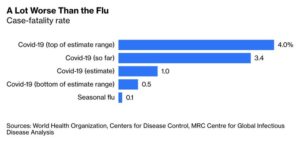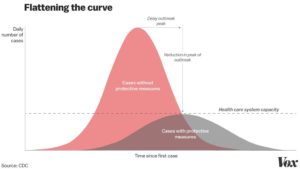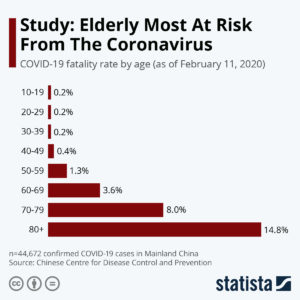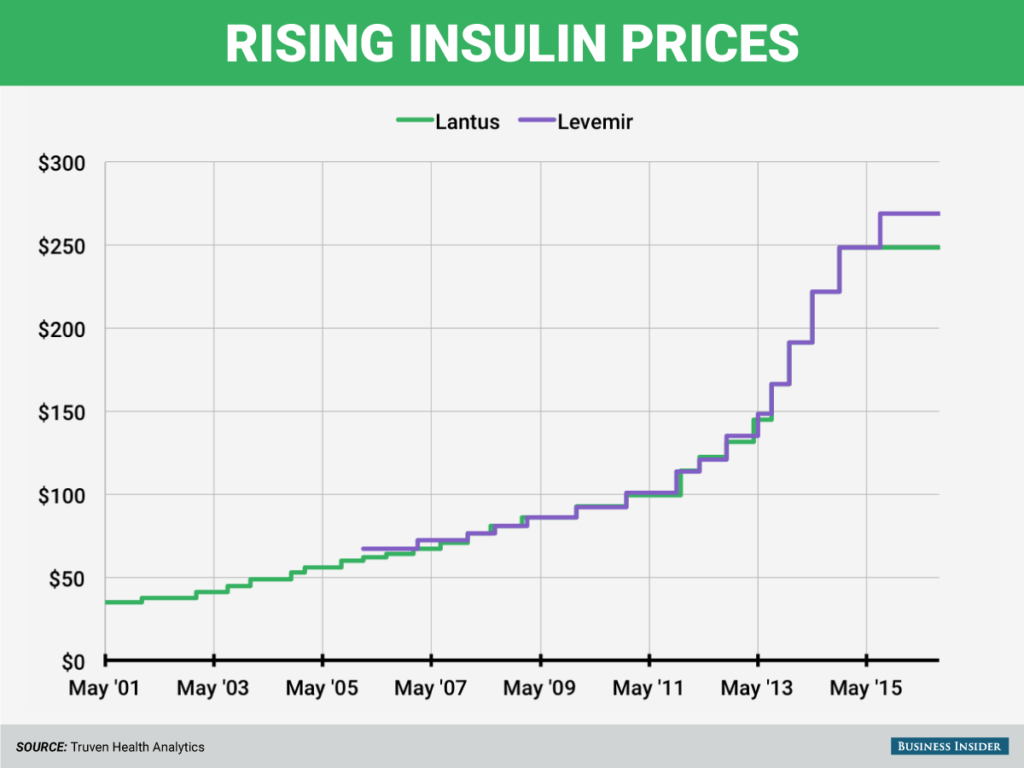
Covid Fatality from Bloomberg
Three weeks ago, Italy had almost no cases of Coronavirus. Today the country is on lockdown. There are so many cases that doctors cannot put ventilators in everyone who needs them, and are having to choose who gets them, leaving many to die who might otherwise live.
Covid-19 has an exponential spread if it is not handled correctly. Donald Trump and the US have chosen to not manage it properly. In fact, in most cases the US has chosen to not even test. We do not know how widespread the Coronavirus is.
Trump is acting like the average American CEO, he is managing the numbers, not the underlying reality.
That may get you killed. Maybe you’re young and healthy, then it may kill your parents, grandparents, or other older people you care about.
You should assume, at this point, that there will be an epidemic in the United States and you should prepare for one. Buy the necessary supplies for staying in place for at least two weeks if you have not already. Include any medications if you can. Get some non-prescription anti-virals if you can (raw garlic and bee propolis are decent), because while conventional medicine is superior, you must assume that there will not be enough ventilators, for example, to go around. Heck, there may not even be even be enough beds.
Hospital beds per 1,000 people (OECD):
🇯🇵 Japan 13
🇰🇷 South Korea 12
🇷🇺 Russia 8
🇩🇪 Germany 8
🇨🇵 France 6
🇨🇭 Switzerland 4.5
🇨🇳 China 4.3
🏴 Scotland 4.2
🇦🇺 Australia 3.8
🇮🇹 Italy 3.6
🇪🇸 Spain 2.97
🇮🇪 Ireland 2.96
🇺🇸 USA 2.77
🏴 England 2.3Spot the problem.#coronavirus
— James Melville (@JamesMelville) March 2, 2020
British readers should take note as well.
A lot of organizations are cancelling meetings, there are planes flying entirely empty, school is being cancelled, and so on. All of these things are good.
 Note that the fatality rate soars if the spread of the disease is not slowed, because if there are too many cases all at once, and hospitals are overwhelmed. The chart going around to illustrate this follows.
Note that the fatality rate soars if the spread of the disease is not slowed, because if there are too many cases all at once, and hospitals are overwhelmed. The chart going around to illustrate this follows.
The US isn’t going to have a better curve. So assume that you aren’t going to get good hospital care, and that you might not get hospital care at all.
All of this is, of course, a bad case scenario. But that scenario is happening, right now, in Italy. If you make preparations and you don’t need them, that’s not a problem. If you do need them, you’ll be glad you did.
 This virus specializes in older, unhealthy people. But young people are carriers, even if they don’t die. So if you don’t have to, you should probably be avoiding older people for the duration.
This virus specializes in older, unhealthy people. But young people are carriers, even if they don’t die. So if you don’t have to, you should probably be avoiding older people for the duration.
Social distancing is not a bad idea. If you can work for home, you probably should. Employers which can have their workers work from home should do that now. Schools should be sending students home, conventions should be cancelled, etc.
In Italy, the government has cancelled mortgage payments. I would suggest that other governments consider the same and do something similar for renters, while also cancelling utility payments, with the government directly compensating utilities. Other similar measures can be imagined.
The American government’s inclination will be to give money to rich people through the Federal Reserve, but it is poor people who need to be convinced they can afford to stay home, and not go to work and keep spreading the disease.
Remember that the virus has a five day average incubation period. You could have it now and feel fine. Further you can have the virus and never get symptoms, but spread it. This is especially likely if you are young and healthy.
So, take this all seriously. It might save your life, or it might save the life of someone you care about.
As for the politics, it all depends. If it’s not too bad, Trump can keep the lid on it. People will die, the media doesn’t really report it, he survives. If it truly breaks out, and people are sharing videos of their grandmothers dying without health care because hospitals are overwhelemed, he’s going to get the blame–quite deservedly so. Of course, most politicians, including Trump, Biden, and Sanders, are old, and are at high risk to get the disease and die. Trump, in particular, is obviously not healthy.
The Coronavirus is not a hoax, it is deadlier than the flu, and the response has been bungled.
Edit: One of the symptoms is coughing blood. An herbalist I respect has suggested Dragon’s Blood (Sangre De Grado) might help with that. I pass this on very tentatively, I’m not a doctor and don’t play one, but I have ordered some for myself. It’s not expensive. None of this is a substitute for hospital care, of course, but hospitals may be overwhelmed.
The results of the work I do, like this article, are free, but food isn’t, so if you value my work, please DONATE or SUBSCRIBE.

 Capitalism is based on the premise that profits reflect work that people want done, which is also worth more than the costs of its inputs.
Capitalism is based on the premise that profits reflect work that people want done, which is also worth more than the costs of its inputs.